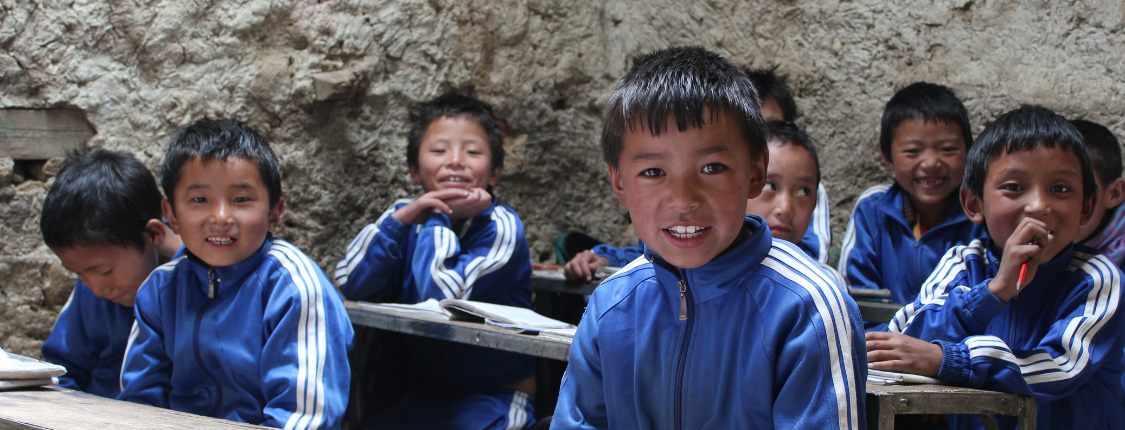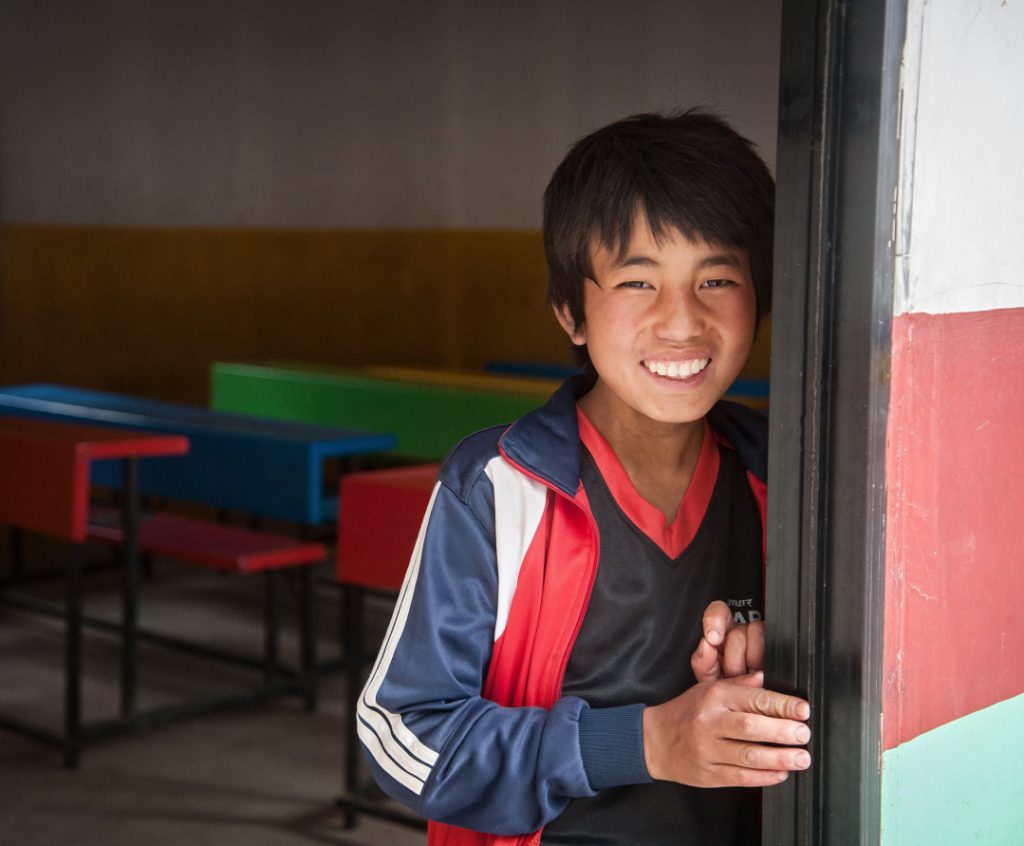Earlier this year, we launched our 2023-2025 Strategic Plan titled Strong Foundations, Broad Horizons. Structured through four lenses, this plan will see us:
- Impact many more lives through our deep commitment to developing and scaling models of health and education excellence, including AdaraNewborn and AdaraRemote.
- ‘Prove and improve’ our programmes, with an enhanced emphasis on monitoring and evaluation.
- Amplify our reach by sharing our knowledge widely.
- Resource and enable our vital work through robust strategies to continue developing Adara’s operations.
“When we began conversations about our strategic plan last year, we knew it would be important to reflect on the models we have developed over the years,” says Adara’s CEO, Madeline Vaughan. “As such, this new strategy is acknowledgment that as we seek to broaden our impact through scale and knowledge sharing, we are building on a 25-year history of deep service delivery to people living in some of the world’s remotest places. There is no better time than now to take our transformative models to scale.”
But what exactly do these models look like and how do we plan to scale them? We spoke with some of the Adara team about their plans for the coming three years.
Scaling AdaraNewborn
With 25 years’ experience working in partnership with Kiwoko Hospital to develop a Centre of Excellence, we are now scaling our programmes to accelerate change across Uganda through our AdaraNewborn model.
“Kiwoko Hospital was our first AdaraNewborn site 25 years ago,” says Daniel Kabugo, Adara’s Uganda Country Director. “As we look to expand our impact across Uganda and beyond, Kiwoko sits at the heart of this work. AdaraNewborn is all about leveraging the learnings and success of Kiwoko and scaling that across Uganda to support more women, newborns and families to thrive.”
Through AdaraNewborn, we will expand our high impact, evidence-based model of maternal and newborn care to 10 facilities in Uganda over the next decade. We aim to halve newborn deaths and stillbirths in these facilities. The model works to address the quality and availability of services across the continuum of care. It includes five arms: antenatal care, intrapartum care, inpatient care for small and sick newborns, postnatal care, and follow-up care and early intervention
“To scale this model, we really focus on building leadership and governance in AdaraNewborn facilities, providing clinical training and mentorship, and implementing strong quality improvement systems,” Daniel says.
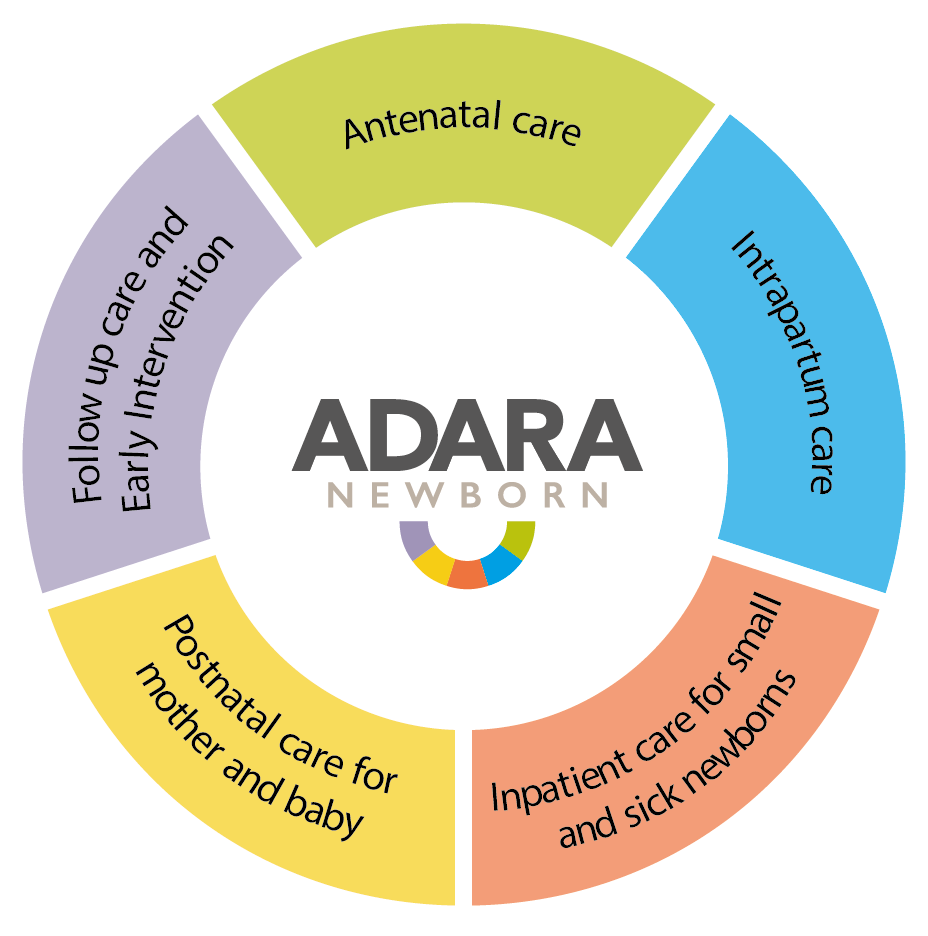
“Our experience at Kiwoko Hospital has also shown us that introducing a training programme, or providing equipment alone, is not enough to create and sustain change. Through our AdaraNewborn Theory of Change, we identified several factors that are critical to the success of this work. They include enough trained staff, evidence-based interventions and guidelines, physical resources including space, equipment and infrastructure, family-centred care, reduced barriers, monitoring and evaluation, financial support, and strong governance systems. AdaraNewborn is a truly comprehensive model that addresses all of these factors to scale our impact.”
In partnership with the Government of Uganda and other implementation partners, we will strengthen two regional centres of excellence that will work with surrounding target hospitals, health centres and community health systems.
Over the next decade, we plan to reach half a million women and children, and prevent over 7,000 deaths. We will impact many more communities by sharing our knowledge and resources with health facilities and professionals locally and globally.
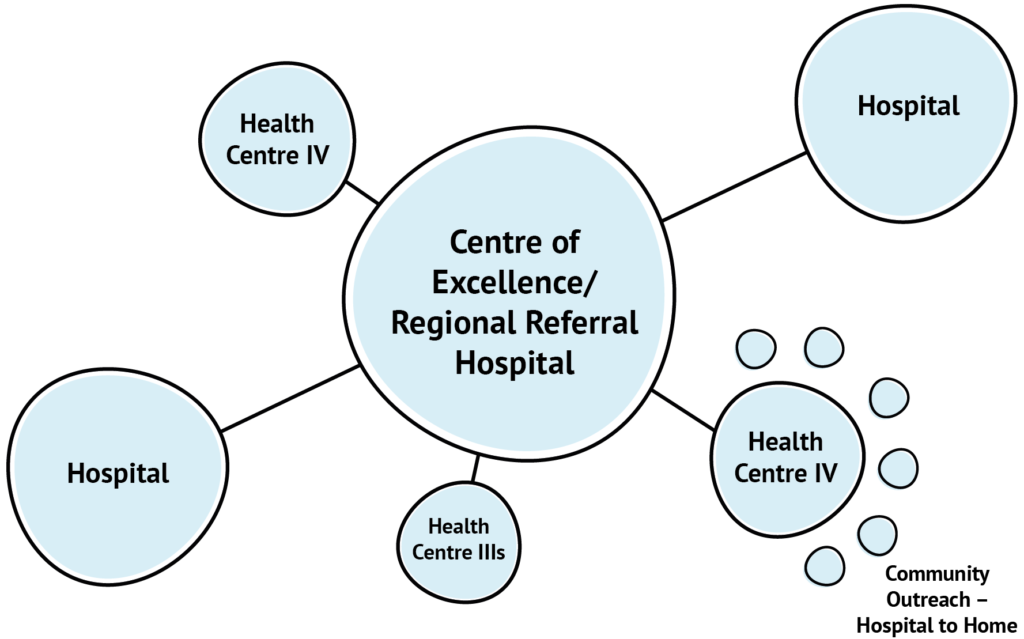
Through AdaraNewborn, we will strengthen the Ugandan health system and support sustainable systems change. This will save lives now and help reduce maternal and newborn deaths and morbidity into the future.
“We have big dreams for AdaraNewborn. Through this model, we will reach more mothers and babies, and most importantly, save many more lives,” Daniel says.
Scaling AdaraRemote
Over the past 25 years, we have developed a comprehensive child-centred model for community development – AdaraRemote. This model centres on education, ensuring that all children in our communities of operation, especially girls, have access to quality education from early learning to tertiary level.
AdaraRemote is underpinned by three foundations: strengthening child protection, building resilience to disasters and climate change, and ensuring people can enjoy good health. We believe that these foundations – together with strong education programmes – can support communities to truly thrive.
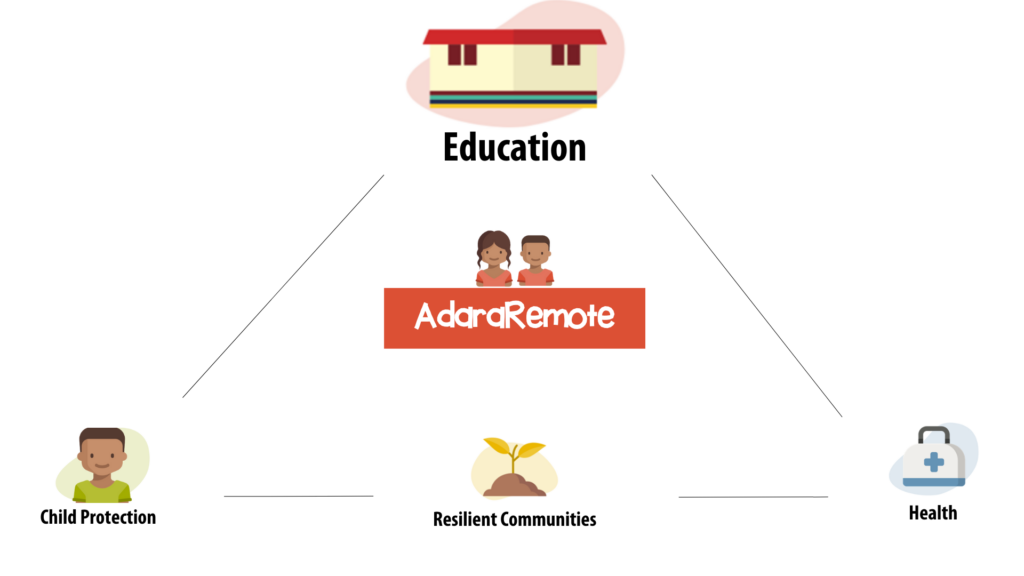
Education is at the centre of AdaraRemote because of its power to transform the lives of children, women and their communities. We have learnt this from our work with many schools in Nepal over the years, but particularly from the Yalbang School.
The Yalbang School was our first ever project. Together with our partner, the Himalayan Children Society, we built the school and an accompanying hostel for children in surrounding villages.
Today, Yalbang is a Centre of Excellence in remote education. In 2017, it was recognised by the Nepal government as a top five school in the entire country and the best school in remote Nepal. Through this experience, we have identified six core components that we believe are essential to the development and maintenance of a model school.
“We are taking what we have learnt from over two decades’ experience working in the most remote areas of Nepal. It is our hope that this model will provide individuals and organisations with the resources to implement the model in their own communities,” says Pralhad Dhakal, our Nepal Country Director. “We believe this education model has the potential to change the lives of so many people living in remote, low-resource settings in Nepal and around the world.”
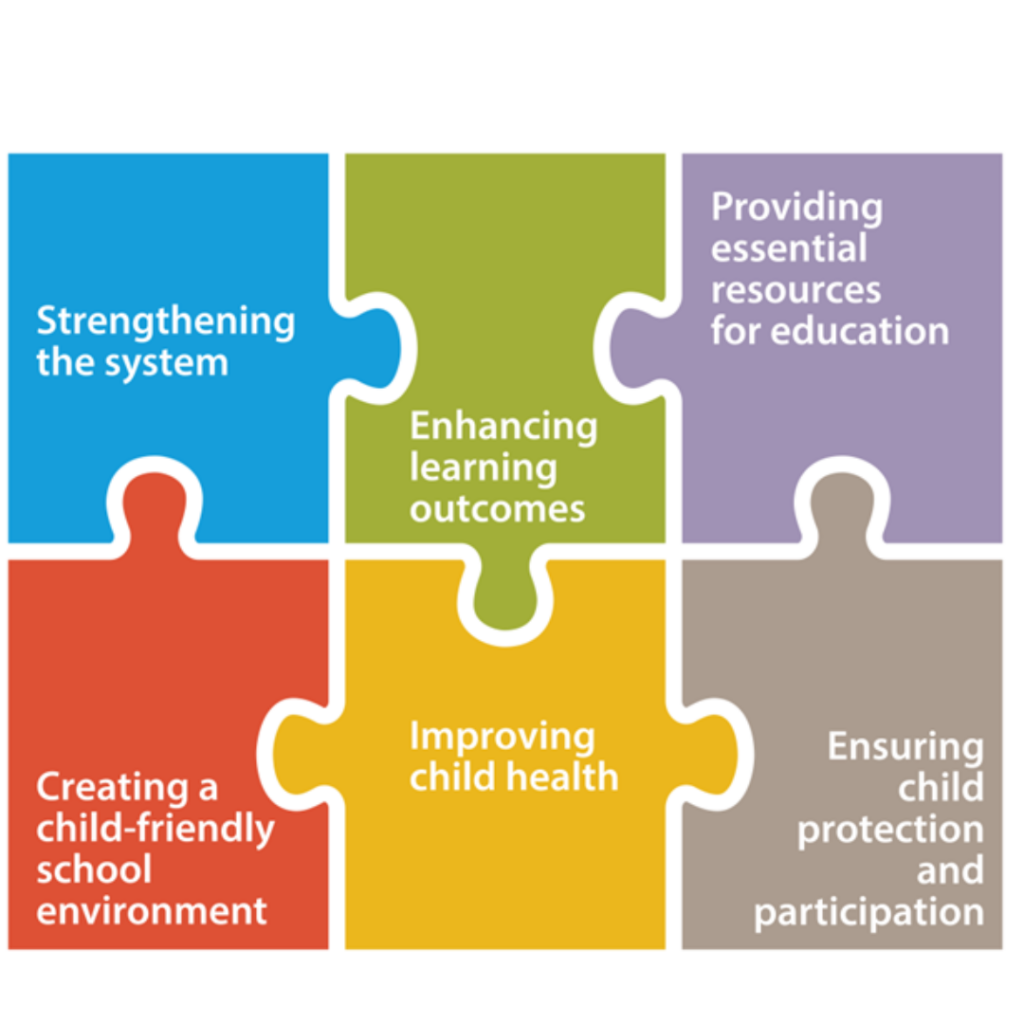
This work is already underway across the remote Humla and Ghyangfedi regions of Nepal, where we have taken the learnings and best practice from Yalbang and adapted the model to the unique needs of each community. Our AdaraRemote education projects now span 16 schools.
“Yalbang’s impact is reverberating across Nepal,” says Pralhad. “When we began working alongside the Ghyangfedi community after the 2015 earthquake, we knew education would be key to transforming lives. As we established our education projects in Ghyangfedi, we drew heavily on our learnings from Yalbang and adapted our model for this specific context.”
Over the coming three years, we will expand AdaraRemote into two additional villages in Humla: Syada and Santa. We will also continue to package our model for other non-profits and organisations to learn from and implement.
We estimate that we will reach hundreds of thousands of people over the next three years through both our Maternal, Newborn and Child Health, and Remote Community Development work and our efforts to scale our impact.
“I am looking forward to sharing the journey of deeper service and broader impact with you, as we bring this exciting plan to life over the next three years,” Madeline says.
Read our full 2023-2025 strategy: https://bit.ly/AdaraStrategy
